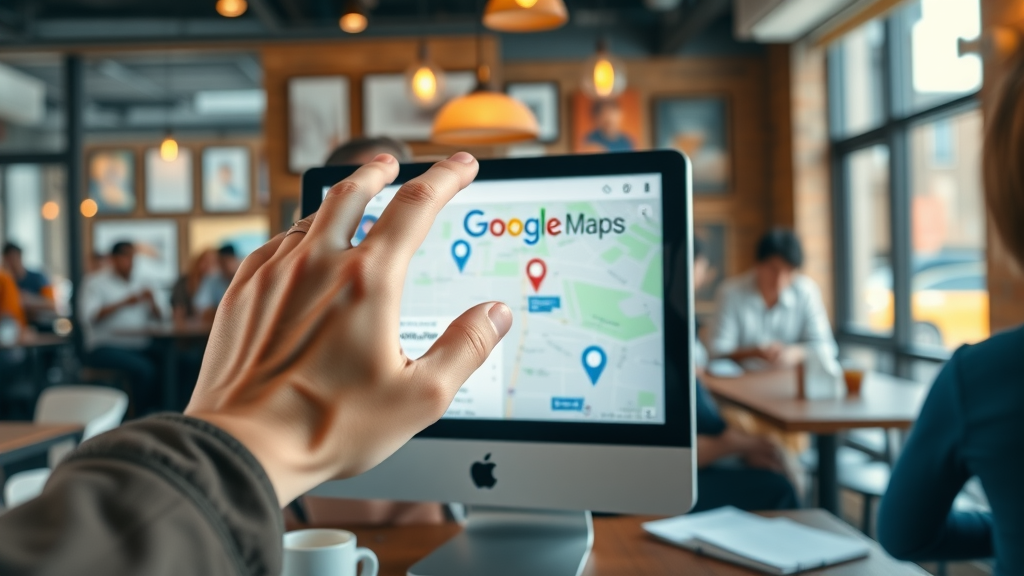Did you know? Nearly 70% of new calls to Denver contractors begin with a Google Maps search, and those who land in the top three spots are fielding the lion’s share of leads. As competition intensifies, those with a smart local SEO strategy are the ones dominating—the rest risk being invisible online. In this comprehensive guide, we’ll break down the exact steps Denver small businesses are taking to claim those coveted map spots and keep the phones ringing in 2025.
Denver Contractors Are Battling for Google Maps’ Top 3 Spots—The Power of Local SEO
"Local service pros say 70% of new calls start with Maps. The winners consistently invest in local SEO and profile optimization." – Denver Digital Marketing Expert
If you run a small business in Denver—whether you’re a contractor, plumber, or local retailer—the competition for Google Maps’ “local pack” is fierce. The top three listings in the Google Maps search results capture the majority of clicks, calls, and in-store visits. As more businesses wake up to the importance of local SEO, simply having a presence online isn’t enough. Optimizing your Google Business Profile, earning reviews, and targeting local keywords are now essential tactics. Staying updated with Denver-specific search engine trends and fine-tuning your business info can mean the difference between steady leads or missed opportunities. Let’s dive into exactly how you can rise to the top and thrive amidst Denver’s highly active local market.

What You’ll Learn About Local SEO
Understand the fundamentals of local SEO for Denver
Identify local search ranking factors impacting your small business
Optimize your Google Business Profile for maximum visibility
Apply strategies to improve local search engine visibility
Access expert tips for dominating local search results, even against tough competition
What Does Local SEO Mean?
Defining Local SEO for Small Businesses in Denver
Local SEO is a branch of search engine optimization centered on increasing online visibility for businesses that serve customers in a specific area—like Denver. For small business owners, local SEO means getting your company to show up on Google Maps, in the top spots of local search engine results, and in directories when people are searching for your services “near me.” It involves optimizing your Google Business Profile, website, and online listings so that search engines understand exactly who you are, what you do, and where you do it—putting you in front of more nearby potential customers.
By focusing on local keywords (such as “Denver contractor” or “best plumber in Denver”), updating your business info, earning high-quality reviews, and maintaining NAP consistency (name, address, phone number) across directories, your local ranking will steadily improve. That means more calls, more leads, and more business from customers in your backyard.

Is Local SEO Free?
Free Tools and Paid Strategies for Local SEO
Great news: building your local search engine presence in Denver can start with entirely free tools. Google Business Profile is free to claim and manage. You can also use free platforms like Google Keyword Planner or Google Trends to find local keywords relevant to your business. Directory listings on sites like Yelp or BBB often cost nothing and go a long way toward strengthening your online presence. Social media can be leveraged at no direct cost for visibility and review management.
However, as competition grows, many Denver businesses turn to paid strategies such as hiring an SEO consultant, investing in citation management services, or running targeted local ads to accelerate results. Both approaches—free and paid—can move the needle on your local SEO, but consistent effort and expert input often deliver faster returns and more durable search engine ranking improvements.
Is Doing Local SEO Worth It?
Measuring Local SEO ROI for Denver Small Businesses

Every successful Denver contractor or service provider will tell you—local SEO pays off. The majority of local searches from mobile devices or desktop (think: “Denver roofing repair” or “best dentist near me”) have a high intent to purchase. Appearing in those top map results often means outpacing your competitors for new leads and calls. Trackable data like calls from your Google Maps listing, review growth, and increases in clickthrough from map search results provide concrete ROI that traditional marketing channels rarely match.
Beyond numbers, a solid local SEO campaign builds long-term brand authority, trust in your business info, and a reputation as a community leader. For small businesses in Denver, putting effort into local search engine optimization is a high-ROI growth move that consistently outperforms old-fashioned advertising.
How Much Does Local SEO Cost in the US?
Typical Local SEO Pricing for Small Businesses
The cost of local SEO services in Denver (and typically across the US) ranges from free do-it-yourself efforts to $500–$2,500+ per month for expert help. Most local businesses spend between $400 and $1,200 monthly with a reputable agency or consultant handling profile optimization, citation building, on-page keyword updates, and review management. Basic setup (claiming your Google Business Profile and getting listed on directories) may require a one-off investment of a few hundred dollars if you want professional assistance. Ultimately, the investment depends on your goals, how crowded your niche is, and how fast you want to move up the rankings.
Consider the cost of missing out on the bulk of local search results and customers by not showing up in the map pack. The upside of increased leads and visibility often makes the investment in proper search engine optimization an easy choice for growing Denver businesses.
Understanding the Denver Google Maps Landscape: Local Search, Competition, and Ranking
The Importance of Local Rankings for Small Businesses
Ranking high in Denver’s Google Maps 3-pack means being at the top of local customer searches—right when people are eager to buy or book a service. For small businesses, this visibility is crucial. Recent studies confirm that the first three listings (the local pack) pull in 70% or more of the clicks and calls from potential clients. Whether you’re targeting homeowners, renters, or tourists in Denver, climbing the local rankings gives your small business an undeniable edge in generating new business and building a loyal client base.
Google’s algorithm considers a range of factors that impact your placement, from relevance to your chosen local keywords, to your review score, to the consistency of your business info across the web. Mastering these ranking signals for Denver’s local search engine scene will put you miles ahead of less savvy competitors.
Who Dominates the 3-Pack in Denver?
"Most Denver homeowners call the first three listings they see. If you’re not in the 3-pack, you’re missing out on 70% of new leads." – Local Contractor
Right now, the winners in Denver’s Google Maps 3-pack are businesses with perfectly optimized Google Business Profiles, high numbers of recent five-star reviews, accurate contact information, and targeted location-based keywords. Their advantage is no accident—they’re consistently investing in local SEO and monitoring their search engine appearances. If your business isn’t in that top trio, you’re losing out on qualified leads daily. The takeaway? Getting into the Google Maps 3-pack in Denver is more achievable than ever with the right local ranking strategies in place.

Top ranking factors for Google Maps in Denver (2025): |
|
Ranking Factor |
Impact Level |
|---|---|
Google Business Profile |
High |
Reviews and Ratings |
High |
NAP Consistency |
Medium |
On-Page SEO |
Medium |
Backlinks |
Medium |
Keyword Optimization |
Medium |
Step 1: Optimize Your Google Business Profile for Local SEO
Claiming and Verifying Your Google Business Profile
The foundation of local SEO for Denver businesses is your Google Business Profile. If you haven’t claimed and verified your listing, do this immediately—Google gives higher visibility to fully owned and completed profiles. The process involves searching for your business on Google Maps, clicking “Own this business?” and completing Google’s verification steps, usually by phone or mail. Verified listings gain access to essential editing features, messaging, review management, and valuable insights reports to track your local ranking progress. Make sure your phone number and other business info match across all platforms.
Complete Every Field: Business Info That Matters
To dominate Denver’s local search results, make sure every field in your business profile is filled out accurately and consistently:
Essential elements: NAP (Name, Address, Phone)
Accurate hours of operation
Consistent business description using local keywords
High-quality local images
Updated services and business categories
Accurate NAP consistency is vital. Any discrepancy between your Google Business Profile, website, and business directories can damage your local ranking. Instead, use the same phone number, address, and format—down to abbreviations—everywhere. Add high-quality images (interiors, exteriors, staff, and services) to stand out in the local pack and signal trustworthiness to your Denver audience.
Tips for Choosing Local Business Categories

Select the most relevant category—such as “roofing contractor” or “plumber”—that matches your main service. Google uses categories to match your listing to local searches, so be specific but avoid stuffing unrelated options. If you offer multiple primary services, add secondary categories strategically. Check your competitors in the Denver 3-pack to benchmark your choices.
Leveraging Google Posts and Q&A for Better Local Ranking
Google Business Profile offers more than static info—Google Posts let you announce special offers, events, or tips that appear directly in your profile and search engine result pages. Regular posting with relevant local keywords can improve engagement and help signal relevance to Google’s algorithms. Additionally, the Q&A section allows you to address common customer queries, further boosting trust and interactivity (which search engines reward with higher local ranking).
Pro tip: Answer your own questions in the Q&A area with keyword-rich detail, and use Google Posts at least every week to keep your Denver presence fresh.
Step 2: Target the Right Local Keywords for Google Maps
How to Find Local Keywords That Convert
Denver customers don’t just search for “contractor”—they look for “Denver roofing repair,” “plumbers near Union Station,” and specific services combined with a location. Start by using free tools like Google Keyword Planner or Google Trends to research local keywords relevant to your business. Also, scan the top search results in your category for inspiration. Identify keywords with high search volume and buying intent, such as “best HVAC company Denver” or “Denver emergency electricians.”
Using free tools: Google Keyword Planner, Google Trends
Integrating location-based keywords: “Denver contractor”, “plumber near me”, etc.
Mapping local keyword intent to your actual business services
Sample Denver Local Keyword Opportunities (2025): |
|
Keyword |
Search Volume |
|---|---|
Denver roofing repair |
1,300 |
Plumbers near Union Station |
850 |
Embedding Local Keywords in Your Business Profile and Website Pages

After you’ve identified your top local keywords, strategically weave them into your Google Business Profile description, your website titles, and main service pages. Use “Denver + Service” format for headings, meta descriptions, and service descriptions. For example, rather than “Home Repairs,” use “Home Repairs in Denver, CO.” This practice helps Google associate your business with Denver for related local searches. Don’t forget to update image alt text, blog content, and even your social media with targeted local keywords to further strengthen your local search engine optimization.
Avoiding Local SEO Keyword Stuffing
While targeting keywords is important, overusing them—known as keyword stuffing—can backfire. For your Denver business, keep keyword use natural and helpful for human readers. Write for your customers first, then optimize for search engines. Use synonyms and variations (e.g., “Denver electrician” and “electrical contractor near me”), and avoid repeating the same phrases unnaturally. Google rewards clarity and authentic content, so balance is key to achieving lasting local ranking growth.
Step 3: Build Consistent NAP Citations Across Local Search Engines
How Local SEO Uses Citations for Google Maps Rankings
A citation is any online mention of your business’s name, address, and phone number (NAP)—and it’s a vital factor for Google Maps ranking in Denver. Every consistent listing you have on trusted directories like Yelp, BBB, or Nextdoor increases Google’s trust in your business info. Use citation management tools, such as Moz Local or Whitespark, to automate and audit your listings for Denver-centric accuracy. Each matching NAP entry feeds Google more confidence in your legitimacy, which can bump your local search rankings higher.
Top business directories for Denver: Yelp, BBB, Nextdoor
Using citation management tools
Auditing for NAP consistency
Fixing Citation Inconsistencies to Boost Your Local Ranking
Conflicting information—like an old address, misspelled business name, or different phone numbers across directories—hurts your credibility with both search engines and customers. Conduct a thorough audit of all your online listings (including industry-specific and local Denver business directories) and update every outdated entry. Use the same abbreviations and formatting as on your Google Business Profile. The more consistent your NAP data, the stronger your case for top local ranking in Denver Google Maps search results.
Step 4: Accumulate High-Quality Google Reviews and Boost Local SEO
Why Reviews Matter for Your Local Business Ranking
Google heavily favors businesses with more positive, recent reviews—especially within your local area. Quality reviews serve as social proof, drive customer trust, and directly impact whether you land in the map pack. Denver contractors who steadily gather detailed, five-star reviews consistently outperform less-reviewed competitors in local search rankings. Don’t neglect this critical ranking factor; prompt happy customers to leave feedback on your Google profile and relevant third-party platforms.
How to Request and Respond to Reviews Effectively
"A 5-star reputation is often the deciding factor for a customer choosing among local contractors." – Denver Business Owner
Politely request reviews from every satisfied client—especially after a successful job. Make it easy by texting or emailing a link directly to your Google Business Profile review page. Responding quickly to all reviews (positive and negative) signals active engagement with your customer base and shows Google you care about your reputation. Thank every reviewer, address issues with empathy, and encourage repeat business through thoughtful responses.

Managing Negative Reviews and Enhancing Search Engine Trust
Timely, polite responses
Resolve issues to turn critics into advocates
Report fake or spam reviews
Handle criticism with professionalism: apologize for poor experiences and offer solutions when appropriate. Often, unhappy customers update their reviews after issues are resolved, boosting your public perception and local ranking. Report any suspicious, fake, or spam reviews to Google for removal—keeping your business profile trustworthy for local search engines and Denver customers alike.
Step 5: Optimize On-Page Content for Local Search Engine Performance
Using Local Keywords in Titles, Headings, and Content
On-page SEO directly supports your Google Maps listing by confirming your local relevance. Focus every page’s title, meta description, headings, and first paragraphs on your primary local keywords—like “Best Pest Control in Denver, CO.” Use location modifiers throughout blog content and embed Google Maps on your contact or service pages for stronger search engine signals. Remember: the goal is to assure both visitors and search engines that you’re the top choice in Denver.
Location Pages: Best Practices for Denver Contractors
Example On-Page SEO Elements for Local Pages |
|
Element |
Example |
|---|---|
Title |
Best Plumber in Denver, CO |
Meta Desc |
24/7 Emergency Plumbing—Denver Trusted |
Add service areas, landmarks, neighborhoods in site copy
Link your website to your Google Business Profile
Create service area pages for different Denver neighborhoods or suburbs, highlighting your expertise and project portfolio in each. Link your site prominently to your Google profile and ensure local business info is accurate sitewide for the best on-page local SEO impact.

Step 6: Advanced Strategies for Dominating Google Maps and Local Search
Building Local Backlinks from Denver Sites
Local backlinks—from Denver news sites, business associations, nonprofits, or local blogs—enhance your trust with Google and set your company apart in local search results. Look for guest posting opportunities, cross-promotions, or sponsorship mentions that naturally reference your business and link back to your website. The more relevant and authoritative these links, the more powerful the ranking boost for your Maps position.
Mobile Optimization for Local SEO

With most local searches happening on mobile, a fast, mobile-friendly website is non-negotiable. Ensure all contact links (call, directions) are tap-to-action, and your site loads in under three seconds. Google’s search engine now ranks mobile-optimized small business sites above outdated ones—making this upgrade essential for Denver businesses chasing top local rankings.
Leveraging Google Maps Features: Messaging, Bookings, and More
Activate features inside your Google Business Profile like Messaging (for direct chat with customers), appointment bookings, and custom FAQ posts. These tools not only improve your user experience but send positive behavioral signals that Google weighs in its local search algorithm—helping you outrank less interactive competitors in Denver’s market.
Monitoring Progress with Free Local Ranking Tools
Use free tools like Google Business Profile Insights, BrightLocal, or Local Falcon to track your placement in the Maps pack, key reviews, and visibility trends. Regular monitoring reveals what’s working (and what needs improvement) in your ranking strategy—informing your next moves for even greater search engine success in Denver.
Common Local SEO Mistakes Denver Businesses Make
Ignoring Google Business Profile Updates
Some small businesses in Denver set up their Google Business Profile once—and then forget about it. Search engines and potential customers both look for active, frequently updated profiles. If your business info is outdated or you don’t respond to reviews, Google lowers your visibility in local search results. Make it a habit to log in at least monthly to add new images, adjust hours as needed, and post legitimate business updates.
Inconsistent NAP Data Hurts Your Local Rankings
Even a small discrepancy in your phone number, address, or business name across directories can harm your local ranking. Double-check your business info everywhere—Google, Yelp, social media, your website, and industry directories. The surest way to undermine your own search engine result is to overlook NAP consistency.
Not Monitoring Local Search Results Regularly
If you’re not actively checking where your business stands in Google Maps and the local pack, you’re missing out on easy opportunities to improve. Use Google’s free tools to routinely assess your position, keep an eye on what your competitors are doing, and spot negative reviews or inaccurate local business info before customers do.
Neglecting mobile experience
Forgetting to ask for reviews
Overusing local keywords
Measuring Local SEO Success: Tracking Metrics and Search Engine Performance
Key Local SEO KPIs for Small Business
Map Pack visibility
Review volume and rating trends
Call and website clickthroughs from Google Maps
Citation and backlink improvements
Track these critical KPIs to see real progress: how often you’re in the map pack for target keywords; whether your ratings are improving; how many calls or website visits you’re getting from Google Business; and the growth in consistent citations and local backlinks. These data points are key signals for both your business growth and future local search engine optimization pivots.
Using Google Business Profile Insights and Other Free Tools
"Tracking your local SEO metrics is the only way to know if your strategies really work." – Digital Marketing Specialist
Google Business Profile’s Insights dashboard displays queries that bring up your listing, user actions (calls, requests, messages), and how customers found you (Maps, Search, etc.). Pair these free tools with analytics from your website, social media, and citation platforms to monitor your improvement in Denver’s tough local rankings.
Key Takeaways: Winning With Local SEO in Denver
Claim and complete your Google Business Profile
Diversify and optimize local keywords
Grow and manage your Google reviews
Ensure NAP consistency across all business info
Monitor progress with local search ranking tools
Top Local SEO FAQs for Denver
How long does local SEO take to work in Denver?
Most businesses start seeing measurable local ranking improvements within 2–3 months, but accelerating into the Google Maps 3-pack may take 6–12 months of steady effort, especially in competitive Denver industries.What’s the difference between regular SEO and local SEO?
Regular SEO targets broad search terms for national/global traffic, while local SEO is focused on ranking in specific geographic areas through maps, directories, and location keywords to drive walk-ins and calls from local customers.How important are photos in my Google Maps ranking?
Extremely important. High-quality, recent photos improve your clickthrough, trust, and time-on-page, and Google’s algorithms reward active profiles with lots of visual detail and real images of your team, services, and location.Can I do local SEO myself or should I hire a pro?
You can start local SEO yourself with free tools and basic strategies, but professionals bring the expertise, ongoing management, and competitive analysis needed to leapfrog rivals in Denver.What’s the fastest way to climb the Google local search rankings?
Complete your Google Business Profile, earn real reviews, fix citation inconsistencies, and regularly update your local content—these actions deliver the fastest, most sustainable ranking boosts in Denver’s map pack.
Conclusion: Take the Next Step to Boost Your Denver Local SEO
Ready to break into Denver’s Google Maps 3-pack and drive more calls? Book a Free Consultation or text us at 720.892.5968 to get a custom local SEO plan tailored for your business.
 Add Row
Add Row  Add
Add 




Write A Comment